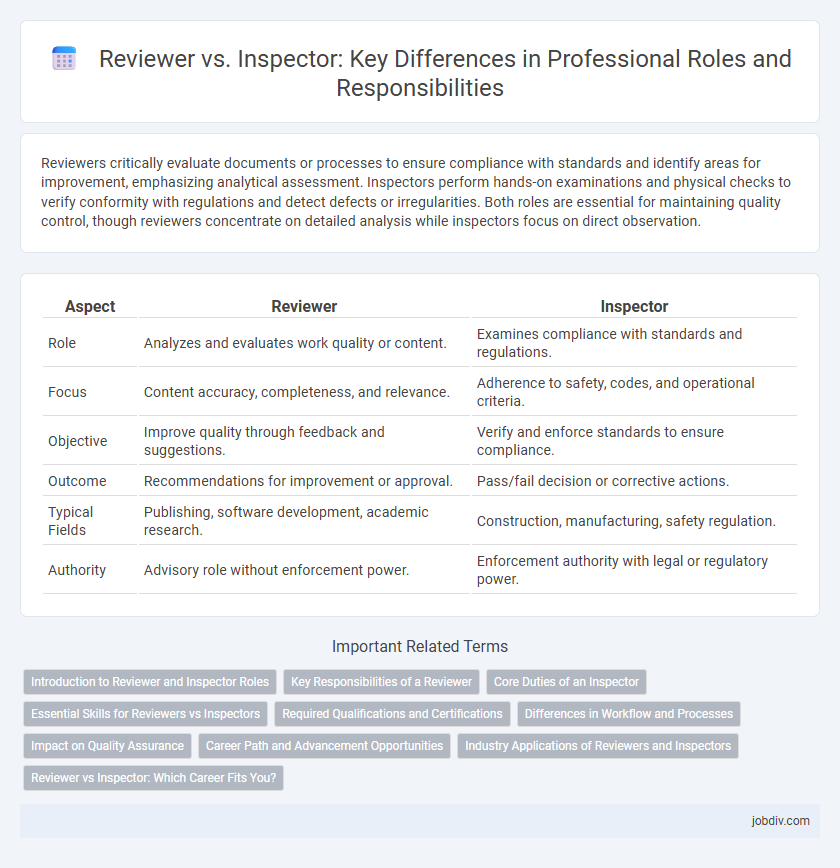Reviewers critically evaluate documents or processes to ensure compliance with standards and identify areas for improvement, emphasizing analytical assessment. Inspectors perform hands-on examinations and physical checks to verify conformity with regulations and detect defects or irregularities. Both roles are essential for maintaining quality control, though reviewers concentrate on detailed analysis while inspectors focus on direct observation.
Table of Comparison
| Aspect | Reviewer | Inspector |
|---|---|---|
| Role | Analyzes and evaluates work quality or content. | Examines compliance with standards and regulations. |
| Focus | Content accuracy, completeness, and relevance. | Adherence to safety, codes, and operational criteria. |
| Objective | Improve quality through feedback and suggestions. | Verify and enforce standards to ensure compliance. |
| Outcome | Recommendations for improvement or approval. | Pass/fail decision or corrective actions. |
| Typical Fields | Publishing, software development, academic research. | Construction, manufacturing, safety regulation. |
| Authority | Advisory role without enforcement power. | Enforcement authority with legal or regulatory power. |
Introduction to Reviewer and Inspector Roles
A Reviewer evaluates documents, processes, or products to ensure accuracy, compliance, and quality standards are met, often providing feedback for improvement. An Inspector conducts detailed examinations or tests on physical assets, environments, or operations to detect defects, risks, or regulatory violations. Both roles are critical in maintaining organizational integrity and operational excellence across industries.
Key Responsibilities of a Reviewer
A Reviewer evaluates project documentation, ensuring accuracy, compliance with industry standards, and alignment with client requirements. They critically analyze technical reports, contracts, and deliverables to identify errors, inconsistencies, and areas for improvement. Their responsibilities include providing detailed feedback and recommendations to enhance quality and facilitate decision-making processes.
Core Duties of an Inspector
Inspectors conduct thorough examinations and evaluations to ensure compliance with regulatory standards, safety protocols, and operational procedures. Their core duties include identifying defects, assessing risks, and verifying that processes meet quality benchmarks. Unlike reviewers who analyze documents or reports, inspectors perform hands-on inspections to detect physical discrepancies or hazards in various industries.
Essential Skills for Reviewers vs Inspectors
Reviewers excel in critical analysis, attention to detail, and providing constructive feedback to improve processes or products. Inspectors possess strong observational abilities, knowledge of compliance standards, and expertise in identifying defects or deviations during evaluations. Both roles require effective communication and documentation skills to ensure accurate reporting and continuous quality enhancement.
Required Qualifications and Certifications
Reviewers typically require strong analytical skills combined with relevant industry certifications such as Certified Quality Auditor (CQA) or Project Management Professional (PMP) to effectively evaluate processes and documents. Inspectors often need specialized certifications like Certified Safety Inspector (CSI) or OSHA safety certification to ensure compliance with standards and identify safety hazards during physical site assessments. Both roles demand a thorough understanding of regulatory requirements, but reviewers focus more on documentation and procedural accuracy, while inspectors emphasize practical application and safety inspections.
Differences in Workflow and Processes
Reviewers analyze documents or processes to ensure compliance with standards and provide feedback for improvement. Inspectors conduct physical examinations or audits on-site to verify conditions and adherence to regulations. The reviewer's workflow centers on evaluation and recommendation, while the inspector's process emphasizes direct observation and verification.
Impact on Quality Assurance
Reviewers enhance quality assurance by systematically evaluating deliverables for accuracy, completeness, and adherence to standards, ensuring early detection of errors. Inspectors focus on verifying compliance with specific regulatory and procedural requirements, often conducting formal assessments that validate conformity and safety. Both roles collaboratively strengthen quality assurance frameworks by combining detailed scrutiny with compliance verification to minimize risks and improve product reliability.
Career Path and Advancement Opportunities
Reviewers often specialize in evaluating documentation and processes within a specific industry, providing detailed feedback to ensure quality and compliance, which can lead to advanced roles such as Quality Assurance Manager or Compliance Director. Inspectors typically engage in hands-on examination of products, facilities, or systems to verify adherence to standards, with career progression opportunities including Senior Inspector or Regulatory Affairs Specialist. Both career paths offer distinct advancement opportunities based on expertise in analytical review or practical inspection, influencing professional growth in quality control and regulatory fields.
Industry Applications of Reviewers and Inspectors
Reviewers play a critical role in quality assurance by evaluating project documentation, processes, and compliance standards across industries such as software development and pharmaceuticals. Inspectors primarily conduct on-site evaluations to ensure products, machinery, or facilities meet regulatory and safety criteria in manufacturing, construction, and food processing sectors. Both roles are essential for maintaining operational integrity, but reviewers focus on analysis and feedback, while inspectors emphasize physical verification and enforcement.
Reviewer vs Inspector: Which Career Fits You?
A reviewer evaluates content, processes, or products to ensure accuracy, quality, and compliance with established standards, making critical assessments to improve outcomes. An inspector conducts formal examinations, often in regulatory or safety contexts, to verify adherence to laws, codes, or specifications, frequently involving detailed documentation and reporting. Choosing between reviewer and inspector careers depends on your preference for analytical evaluation or hands-on verification and your interest in fields such as publishing, quality assurance, or regulatory compliance.
Reviewer vs Inspector Infographic

 jobdiv.com
jobdiv.com